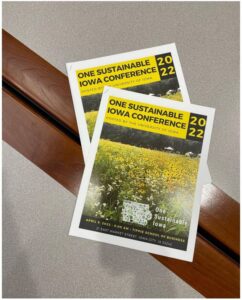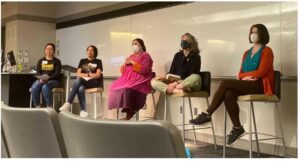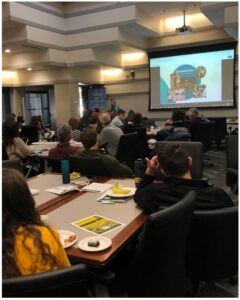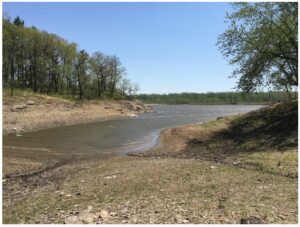![]()
Author: Laura Evans
In case you missed it, last week the University of Iowa hosted a sustainability conference! Among the conference’s numerous guests, speakers included Stephaine Arne of Mutual of Omaha’s Wild Kingdom, and the founder of Intersectional Environmentalism, Leah Thomas. I highly recommend attending (free of charge for students!) in the future if you have the opportunity. Additionally, members of the Iowa City Council, local businesses practicing sustainability, and The University of Iowa’s Board of Sustainability came to speak. The highlight for me was hearing about local efforts to implement clean energy and better environmental protections in our Iowa legislature. Below, I will summarize some of what I learned from the conference’s environmental policy workshop.

The conference’s itinerary was distributed in pamphlets. Image via @sustainui on Instagram
Two speakers, Ingrid Gronstal, a lawyer and the Water Program Director for the Iowa Environmental Council, and Matt Ohloff, the Clean Communities Manager for the same company, lead the environmental policy workshop session. They opened by talking about their nonprofit organization, the Iowa Environmental Council, which, “is the largest and most
comprehensive environmental coalition in the state.” Essentially, this allows businesses to join together and bring demands to either businesses (like MidAmerican) or the government and pressure them into enacting positive change. Their website, IAEvironment.org is home to education resources, updates on sustainable and environmental policy, and even a blog of its own which covers topics like resiliency, advocacy, and more!
The Iowa Environmental Council (IEC) has 4 primary goals. The first goal is to enact climate change policies, the second is to expand diversity, equity, justice and inclusion in green spaces and green policy, the third is to support grassroots environmental action in local communities, and the final goal is to promote the involvement of the next generation! The IEC approaches changemaking with a three-pronged strategy: partnerships and outreach, policy, and rulemaking
in the courts. While those may sound self-explanatory to some, I will explain them briefly because I did not understand the difference between policy and rulemaking! Partnerships and outreach entail contacting businesses and expanding IEC’s network to increase the weight behind their demands. Policy entails the actual creation of new laws, while rulemaking deals with the courts’ interpretation of how those laws must be followed in the day-to-day.

Question and Answer time was a part of almost every session. Image via @sustainui on Instagram
The IEC currently works to address several problems which fall under the umbrella term “climate change.” One aim is the reduction of agricultural pollution, since Iowa relies heavily on corn and soy production and the lack of variety in the crops grown contributes to a depletion of nutrients in the soil. To replenish the soil, harsh fertilizers are used, which can pollute the environment through runoff into water sources (read more about agricultural pollution in this guide). The IEC hopes to mitigate floods and enhance climate resilience by diversifying the state’s job market and income sources as well, through the creation of parks and promotion of tourism. Additionally, the IEC prioritizes protecting and expanding Iowa’s clean energy initiatives, the electrification of heating and cooling systems (moving away from natural gas), and an equitable transition while the state implements these changes. “Equitable transition” means leaving no community behind during upgrades to clean energy across the state.

Stephine Arne’s lecture on resilience and creativity to enact change. Image via @sustainui on Instagram
When implementing environmentally impactful changes, cites often use a combination of creating a climate action plan and a clean energy goal. In January of 2021, Des Moines passed a “24/7 Clean Energy” plan with the goal of running fully on clean energy by 2035. The “24/7” method focuses on an hour-by-hour energy goal, which means all electricity used in an hour must match generation of the same amount of power from a clean energy source. This forces the city to track its energy sources and produce clean energy locally and at the same time (equal temporal exchange) as electricity consumption occurs. Previously, companies could purchase an alternative termed, “Renewable Energy Credits” or RECs, which would offset carbon emissions with an equal amount of clean energy generated somewhere, but the government does not require companies to insure these RECs result in local clean energy production, nor must that production necessarily occur in the same window of time of the carbon emissions they offset. If I lost you there, this Faist Group blog and this World Economic Forum article provide more in-depth explanations and descriptions of the advantages and disadvantages to 24/7 Clean Energy. People in Iowa City and Waterloo hope to pass similar 24/7 Clean Energy bills in their respective cities, but currently no timeline for implementation exists.
Primarily, MidAmerican supplies energy to these areas, but while MidAmerican supplies some clean energy, it still relies on five coal plants in the state of Iowa. Further, MidAmerican lacks any schedule for closure of their coal plants. Around the start of April, a coalition came together to call for MidAmerican to develop a plan for shutting down their coal plants by 2030. You can join this movement, and learn about the damages caused by the excess carbon emissions on the
website: https://www.cleanupmidam.com/. Another practical way to protect Iowa’s environment could be joining or donating to https://www.fundthetrust.org/, which improves water and soil quality, enhances spaces for outdoor recreation, and increases economic development through creation of new job opportunities.

Lake Macbride State Park is a beautiful outdoor space near Iowa City to visit on a day off.
If you made it this far, congratulations! All this new information about environmental policy takes considerable mental energy to digest. You may be wondering, how does protecting the environment relate to sustainability? Essentially, we need sustainable energy and business practices to keep water, land, and air healthy, clean and beautiful! Protecting green spaces contributes to peaceful parks for reflection, recreation and relaxation. Without these reserves, industrial “development” will continue to overrun nature, and pollute our climate. Hopefully, this blog post provides a few stepping stones toward action you can take in Iowa to protect our environment. As always, thank you for reading.
P.S. One last thing I learned at the sustainability conference: if you collect your cooking oil in a jar instead of throwing it away, the East Side Recycling Center in Iowa City accepts oil waste and recycles it!